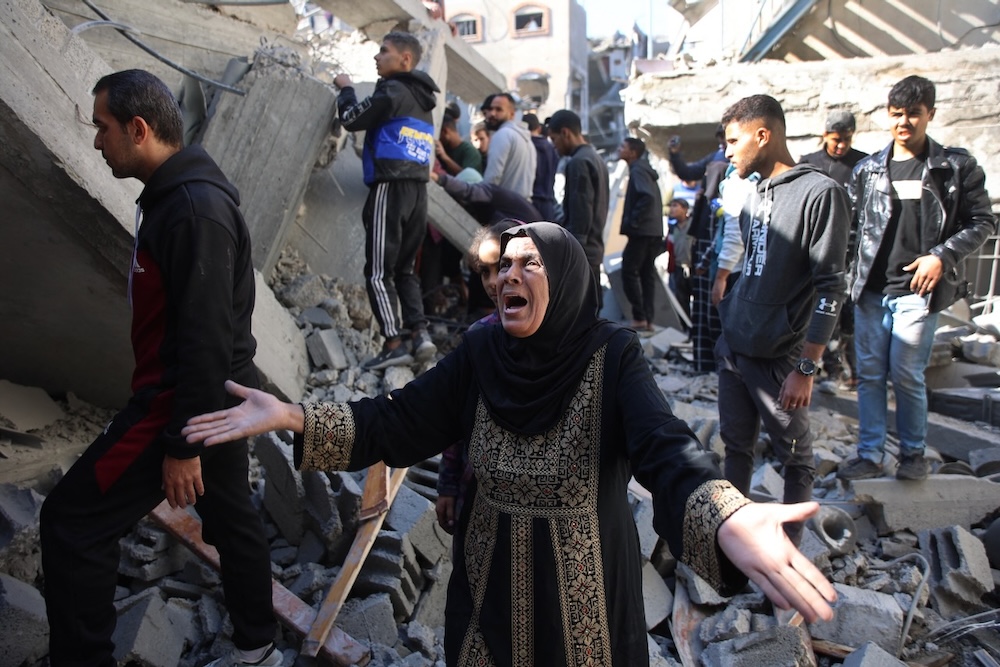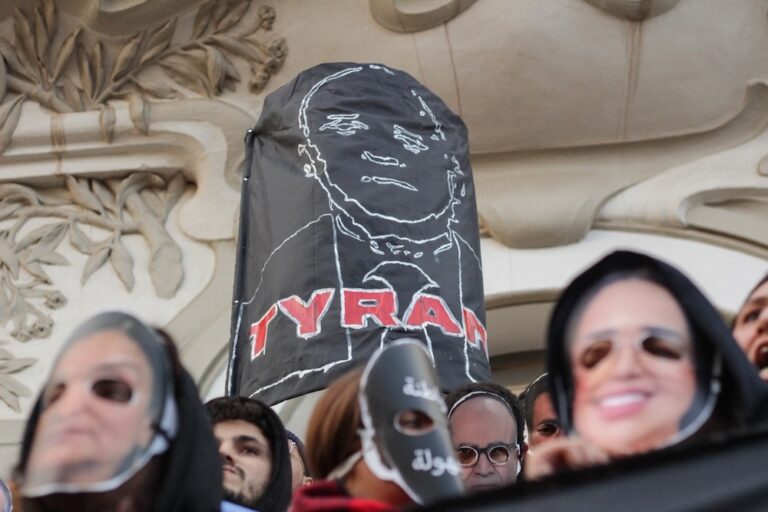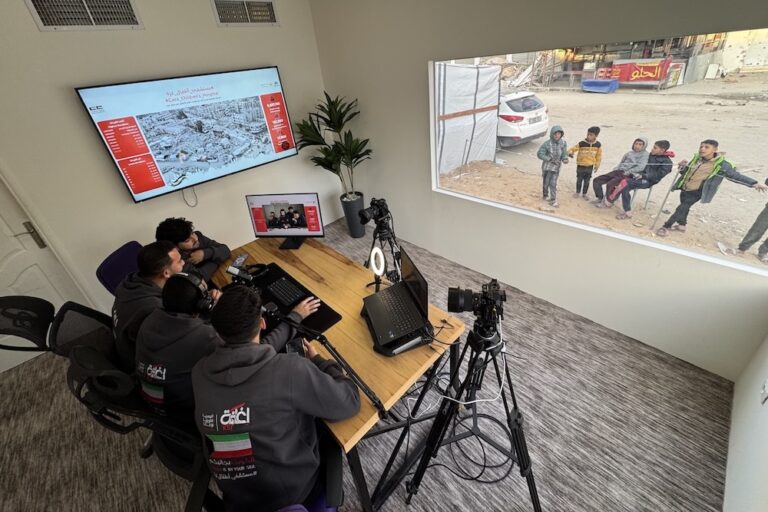November 2024 in MENA: A free expression and civic space round-up produced by IFEX’s Regional Editor Naseem Tarawnah, based on IFEX member reports and news from the region.
The safety of journalists worsens in Gaza and Lebanon, digital harms rise, Egypt targets TikTok, Algeria cracks down on exiled voices, and the Alternative Human Rights Expo highlights detained prisoners of conscience.
Targeted journalists, ICC takes action, and advocating for a ‘digital ceasefire’
Recent weeks have seen the risks facing journalists in Lebanon and Gaza reach alarming levels amid Israel’s regional wars. Two new reports from the Maharat Foundation delve into the threats and impunity of perpetrators targeting journalists in Lebanon, underscoring the urgent need for protections and the vital role of independent journalism.
The targeting of media professionals — at least 200 killed across Gaza and Lebanon — has been condemned as a violation of international law. In a powerful statement, press freedom and human rights groups expressed solidarity with Palestinian and Lebanese journalists, while demanding robust protections and international urgent action to ensure their safety.
IFEX members joined the Cairo Institute for Human Rights Studies (CIHRS) to strengthen calls for a ceasefire to protect civilians including journalists, with a late November ceasefire in Lebanon providing only a limited reprieve for civilians and journalists facing uninterrupted hostilities. Human Rights Watch raised concerns about US-made munitions in Israeli airstrikes that killed three journalists in Lebanon in October.
In Gaza, an Amnesty International investigation found sufficient basis to conclude that Israel has committed and continues to commit genocide against Palestinians in the occupied strip. The report details mass killings, inhumane conditions, and destruction aimed at erasing a people, urging immediate international action to halt the atrocities.
While Palestinians struggle to stay alive, an Israeli-imposed information blackout continues to severely restrict reporting. Between the mass killing of journalists and their displacement, as well as the targeting of communication networks and media infrastructure, the news coming out of northern Gaza especially has grown increasingly restricted. Despite the life-threatening risks they face, a small group of journalists remain on the ground, risking their safety to chronicle these grave violations
A recent Human Rights Watch report confirmed that the violent displacement of Palestinians in Gaza constitutes ethnic cleansing, describing it as widespread, systematic, and part of a deliberate state policy amounting to crimes against humanity.
Marking the International Day to End Impunity for Crimes Against Journalists, MADA reiterated that the impunity enjoyed by perpetrators of these crimes, along with hundreds of other assaults against journalists in Palestine over the past years, has resulted in the deaths of a total of 236 journalists at the hands of Israeli forces since 2000.
In a significant step in efforts to hold Israel accountable, the International Criminal Court (ICC) finally issued arrest warrants for several Israeli officials, accusing them of crimes against humanity related to violence in Gaza. Despite the marginal step towards accountability, concerns about enforcement persist.
Israel’s efforts to silence critical media extend to its own media, with recent sanctions against Haaretz and the privatization of public broadcasters revealing further intent to control Gaza coverage. The Israeli government recently introduced measures, including laws banning foreign media deemed dangerous and a bill giving the government a ‘stranglehold’ on public television budgets, as part of a broader strategy to limit the scope of independent reporting. A UN Special Committee called Israel’s escalating media censorship and suppression of dissent a part of deliberate efforts to block global access to information, also noting that social media companies disproportionately removed “pro-Palestinian content” in comparison with posts inciting violence against Palestinians.
Online platforms have faced increasing scrutiny over their continued contribution to the digital blackout in northern Gaza, as well as content moderation, racism, and the suppression of Palestinian rights advocacy. On 26 November, 7amleh co-hosted a webinar on a human rights-based approach to content moderation, focusing on combating racism and discrimination.
Digital harms against Palestinians also continue to escalate, with internet disruptions and the weaponization of digital spaces obstructing humanitarian efforts and targeting key actors like UNRWA. In response, organizations like Access Now are advocating for a “digital ceasefire” to protect people from online harm and prioritise digital rights in peace efforts.
7amleh’s report on the suppression of tech workers exposed suppression of Palestinian advocacy at major companies like Meta, Google, and Microsoft, urging these companies to uphold freedom of expression and address digital rights violations.
Egypt targets TikTok ‘debauchery’ and dissent
Egypt’s civic space has seen increased repression, with authorities targeting digital platforms, press freedom, and political dissent. MP Essam Diab recently called for a TikTok ban, accusing the platform of “spreading debauchery”. With 37 million users in Egypt, the video platform’s users face scrutiny under the country’s anti-cybercrime laws, leading to arrests of content creators, particularly women, for allegedly “violating family values”.
In another move, the government removed 716 names from its terrorism watchlist, claiming they no longer posed a threat. Critics and rights groups have argued this list remains a repressive tool used to silence opposition voices.
Press freedom continues to deteriorate in the country, with journalist Yasser Abu Al-Ela recently sentenced to 20 years in absentia on charges of false news and terrorism, despite being detained since March. Journalist and press advocate Rasha Azab also reported threats and surveillance for supporting journalists and Palestinian solidarity.
Prominent Egyptian-British activist Alaa Abd el-Fattah remains imprisoned despite completing his five-year sentence in September 2024. Authorities refuse to count his pre-trial detention as “time served.” IFEX and human rights groups have reiterated calls for his release, urging the UN Working Group on Arbitrary Detention to act. In the UK, 15 organizations have called for a suspension of new financial cooperation with Egypt until Alaa is freed, spotlighting broader human rights concerns. Alaa’s mother, Laila Soueif, continues her hunger strike to raise awareness of his plight and demand his release.
In good news, a judicial order finally lifted the asset freeze imposed on Hossam Bahgat, Executive Director of the Egyptian Initiative for Personal Rights (EIPR). The asset freeze was imposed on Bahgat in 2016 as a “precautionary measure” in the notorious Case 173 – the recently closed 2011 foreign funding case that authorities wielded to clamp down on human rights groups.
Algeria’s ‘web of intimidation’
Algeria’s government has intensified efforts to silence dissent both domestically and abroad. A new report by CIHRS details the use of transnational repression against exiled activists, journalists, and human rights defenders through tactics like travel bans, family harassment, and diplomatic pressure for detentions and extraditions.
Under President Abdelmadjid Tebboune, judicial reforms and redefined terrorism laws have targeted political opposition, imprisoning over 250 people for charges like regime change. Dissent has been further suppressed with the dissolution of civil society groups, including Algeria’s oldest human rights organization, LADDH. The recently re-elected president has also banned protests and imposed harsh sentences on critics.
The arrest of French-Algerian writer Boualem Sansal, accused of “undermining national integrity,” sparked outrage in a case that highlights Algeria’s broader crackdown on free expression. Considered an act of “terrorism” under the country’s penal code, the charge carries a penalty of life imprisonment and even death.
While Tebboune recently pardoned some prisoners of conscience, including journalists like Omar Ferhat, Sofiane Ghirous, Ihsane El Kadi and poet Mohamed Tadjadit, many remained imprisoned for their free expression and a climate of fear and censorship persists.
New & Noteworthy
In Iran, activist Kianoosh Sanjari took his own life in protest against the country’s repression. A vocal critic, he faced multiple arrests, harsh treatment, and psychiatric detention. RSF held Iranian authorities responsible for his death, citing years of abuse that contributed to his deteriorating health. Sanjari’s death underscores the severe human rights abuses in Iran, particularly the mistreatment of political prisoners.
The Free Narges Coalition urged the UN Human Rights Council to intervene on behalf of Nobel laureate Narges Mohammadi, imprisoned since November 2021. Despite surgery for a suspected cancerous lesion, she was granted only a 21-day sentence suspension, far less than the recommended three months.
In Yemen, women journalists face severe risks, including murder, harassment, and detention. Two of the 45 journalists killed since 2014 were women. Despite this, some, like Wafa Al-Matari, persist in speaking out. The lack of legal accountability for attackers hinders the protection of female journalists. A recent report by the Gulf Centre for Human Rights (GCHR) highlights ongoing arrests, including those detained for celebrating National Day, emphasizing the crackdown on free expression.
The Gulf Centre for Human Rights (GCHR) hosted the third Alternative Human Rights Expo last month, calling for the release of imprisoned defenders in the MENA region. The event showcased art by Palestinian artists killed in Gaza and highlighted the cases of detained HRDs, including Ahmed Mansoor, Abdulhadi Al-Khawaja, and Atena Farghadani. Speakers condemned rising repression and expressed solidarity with persecuted activists, artists, and dissidents in the region. You can watch it here.
Next month, the UN General Assembly may adopt a cybercrime convention that could empower authoritarian governments in the MENA region to suppress dissent and target marginalized groups. Civil society warns the treaty lacks crucial human rights safeguards, risking increased repression and surveillance. SMEX analyzed the convention’s objectives and limitations in a series exploring its implications for activists and the SWANA region.



